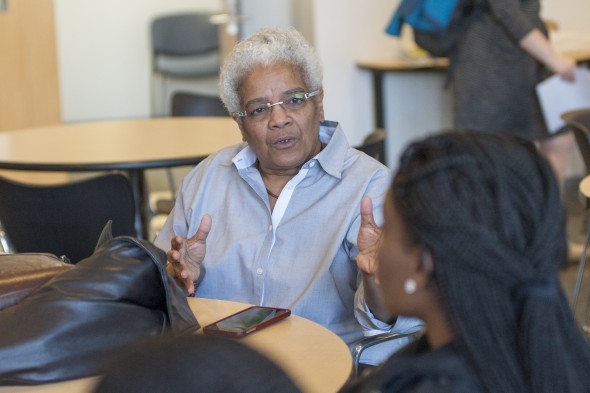Public health impacts the whole planet

“My goal in the classroom isn’t to have my students memorize facts, but to teach them to challenge assumptions so that they can solve problems,” says Linda Rae Murray. Photo: Roberta Dupuis-Devlin/UIC Photo Services
Since 1966, the Silver Circle Award has been presented to some of UIC’s best teachers. Winners, who are honored at their college commencements, receive $500 and their names join a long list of distinguished colleagues. But what makes the award especially meaningful is its selection committee: the graduating seniors.
“I want my students to think holistically about what public health means,” says Linda Rae Murray. “It’s not just about people. It’s about the whole planet, including climate change, animals, plants, humans and social structures and social justice.”
Murray, who earned her bachelor’s, M.D. and master’s in public health at UIC, has more than 40 years of experience as a public health professional — and she’s still a student herself.
She retired as chief medical officer for the Cook County Department of Public Health in December and hopes to finish her doctoral thesis in the next few months. Her topic: the role of public health departments in monitoring local health equity.
She also sees patients once a week at the Woodlawn Health Center.
Murray, who mentors minority students interested in the health professions, is enthusiastic about undergraduate studies in public health. The first class of students earning a bachelor’s in public health from UIC graduated last year.
“Undergraduate students are really able to see the big picture when it comes to public health because they haven’t narrowed down their focus or specialties quite yet,” she says.
Murray, adjunct assistant professor of health policy and administration, co-teaches two classes: Using the Public Health Toolbox and a four-week course that uses literature to examine the relationships between public health, culture, politics, social movements and medicine.
“Some of the things I learned years ago in medical school are no longer relevant because facts, especially in medicine, are constantly changing,” she says.
“My goal in the classroom isn’t to have my students memorize facts, but to teach them to think critically and challenge assumptions so that they can solve problems.”
